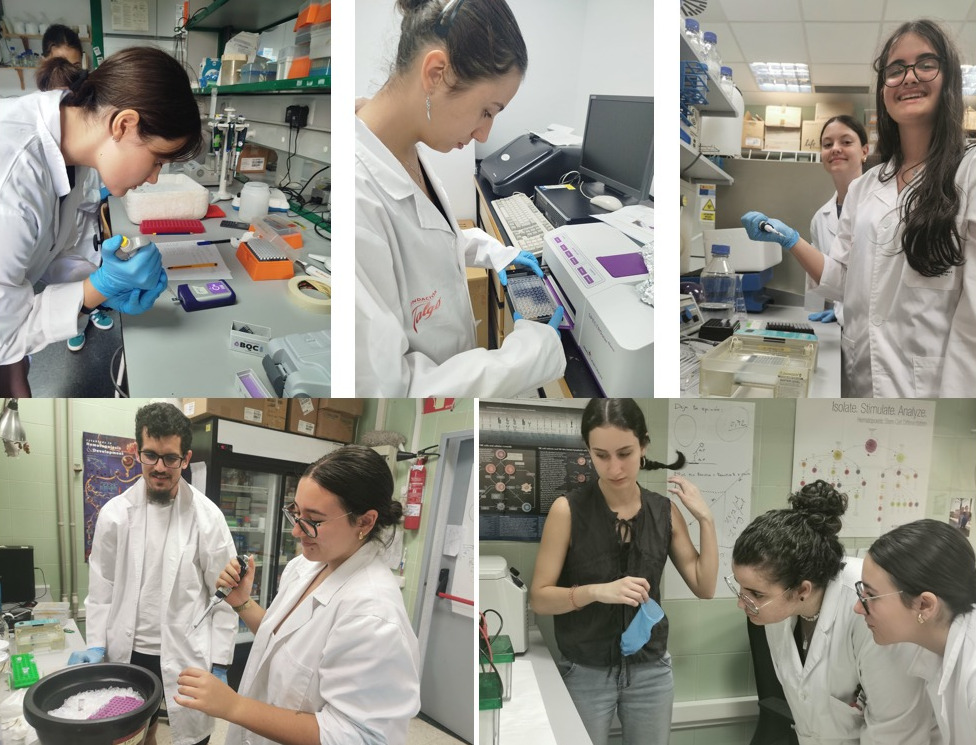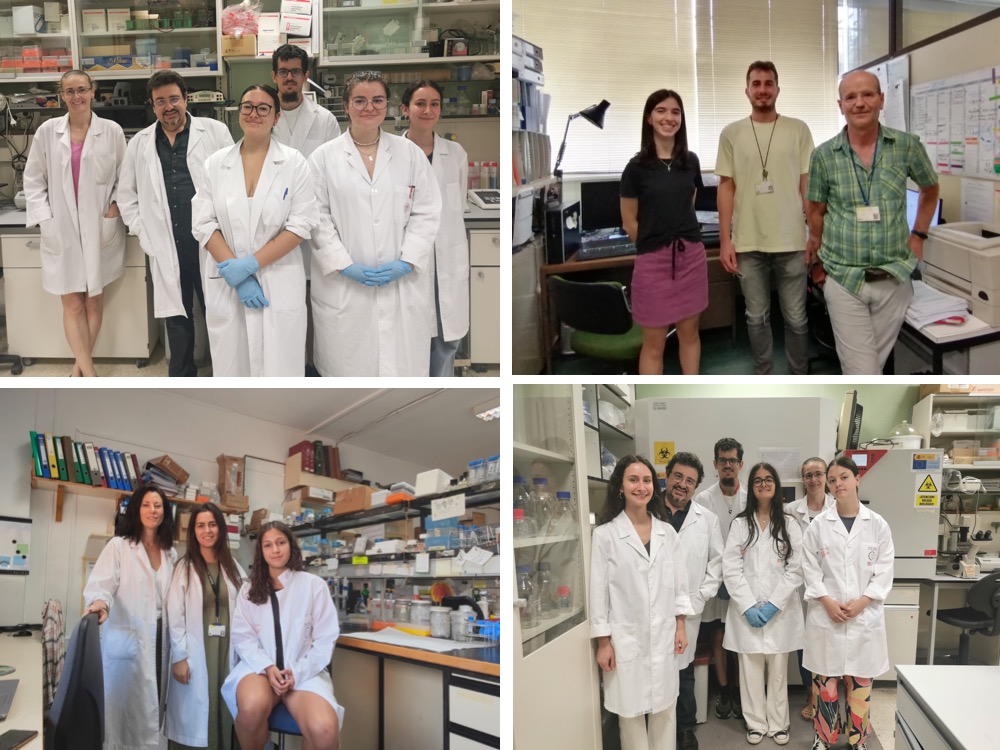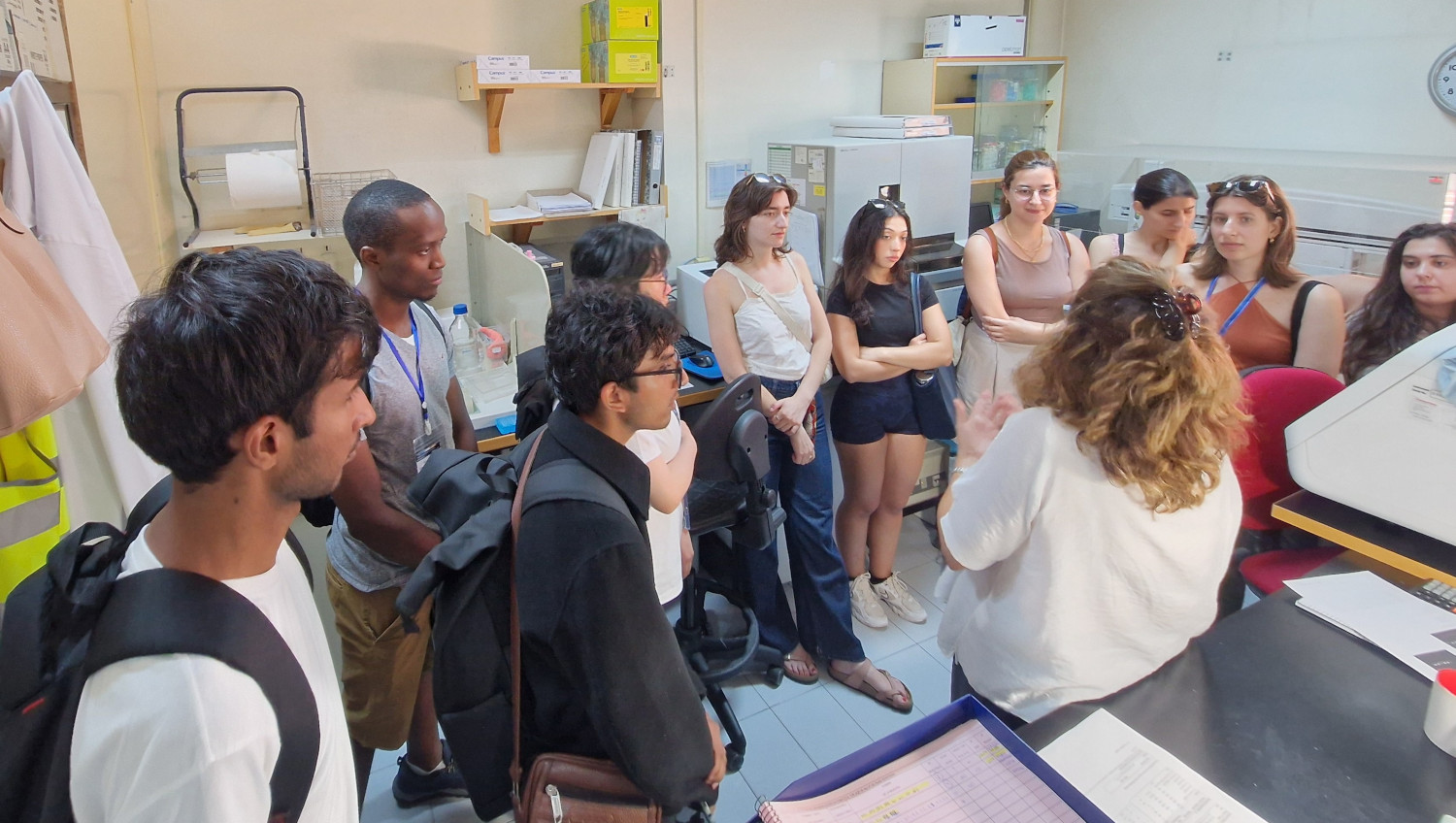- In June, the IIBM hosted six students for research stays as part of the fourth edition of Científic@s en Prácticas, and welcomed two pre-university students who were finalists in the 20th edition of the Olimpiada Española de Biología
- Ten international students from the European Civic University Alliance visited the IIBM as part of a mobility program
Científic@s en Prácticas: nurturing scientific talent in vulnerable environments
The Científic@s en Prácticas program, promoted by the CSIC (under the coordination of Jesús Rey) and the Asociación Española para el Avance de la Ciencia (AEAC), is now in its fourth edition in the Comunidad de Madrid. Its mission is to offer 9th-grade students and 1st-year PMAR students (Programa de Mejora del Aprendizaje y Rendimiento) from disadvantaged backgrounds the opportunity to gain hands-on experience in scientific research.
The Instituto de Investigaciones Biomédicas Sols-Morreale (IIBM), CSIC-UAM, renewed its commitment for another academic year, with the involvement of three research groups that have regularly participated in the program: the Physiopathology and Molecular Mechansims of Obesity and Comorbidities Group, led by Ángela Martínez-Valverde; the Immunity, Immunopathology and Emergent Therapies Group, headed by Juan Manuel Zapata; and the Mitochondrial Function in Health and Disease Group, coordinated by María Monsalve.
The initiative is structured in three phases. First, during December, participating IIBM research groups visit the selected schools to give talks about their work. On December 3rd, Dr. Monsalve visited IES Santa Eugenia (Madrid), and on December 20th, Dr. Martínez-Valverde visited IES Miguel Delibes (Madrid). In the spring, a group of 9th-grade students from IES Santa Eugenia toured María Monsalve’s lab and other facilities at the IIBM to learn about research centers and how laboratory work is conducted. Finally, in June, the students participated in one-week lab internships (June 16–20, 2025). Six students took part, two per research group.
Under the supervision of Juan Manuel Zapata and the researchers in his group — Gema Pérez Chacón, Celia González Muñoz, and Alejandro Baratas Alvárez — Ionela Larisa Mocodean (IES Palomeras-Vallecas) and Sara Fagúndez (IES Joaquín Rodrigo) carried out their internships. In Ángela Martínez-Valverde’s lab, working alongside Elena Carceller López, Elena del Fresno, Silvia Calero Pérez and Ana B. Hitos Prados, were Malak Eddahli (IES San Cristóbal de los Ángeles) and Sofía Diez (IES Alto Jarama, Torrelaguna). And in María Monsalve’s group, under the guidance of Clara Bernet, Leticia Selinger, and Laura Doblado, the interns were Noelia Araujo (IES Dolores Ibárruri, Fuenlabrada) and Sonia Pérez (IES Mariano José de Larra, Madrid).

A key feature of this edition was the visit from the Spanish pharmaceutical company Farmalider, which took place during the students’ week-long internships at the IIBM. Earlier this year, the company signed a collaboration agreement with the AEAC that includes funding for the program, scholarships for school supplies, logistical resources such as transportation for students and their families, and more. Representatives from Farmalider, including the SRC Manager and the Director of Innovation, Ana María Díaz Oliver, from the Red Sanitaria Española de Responsabilidad Social y Sostenibilidad, as well as Jesús Rey, met with the students and researchers to learn about their projects and emphasized the strong commitment of the research groups to supporting youth from underprivileged areas.
Olimpiada Española de Biología: empowering pre-university talent
The Olimpiada Española de Biología (OEB) is an annual competition organized by the Asociación Española de Olimpiadas de Biología to promote the study of biology and introduce high school seniors to the world of scientific research. Participants undergo theoretical and practical tests that determine who will represent Spain at international competitions such as the International Biology Olympiad (IBO) and the Olimpiada Iberoamericana de Biología (OIAB).
In 2025, the 20th national edition of the OEB was held from April 3rd to 6th at the Universidad de La Laguna (Tenerife), with 54 students from all Spanish autonomous communities. Among the regional finalists, two students were awarded a research internship at the IIBM from June 23rd to 27th, 2025. These internships give winners the chance to experience research in centers outside their home regions, enhancing their scientific training and inspiring future careers in biomedicine.

Paola Valiente Pou completed her internship in the Immunity, Immunopathology and Emergent Therapies Group, led by Juan Manuel Zapata, thanks to the participation of Gema Pérez Chacón, Celia González Muñoz, and Alejandro Baratas Alvárez. Originally from Zaragoza and planning to study Pharmacy, Paola spent a week learning both basic techniques and advanced methodologies used in CAR cell research. “It was extremely helpful in allowing me to better understand a field that had seemed abstract to me, and to realize that detecting a protein or a reaction can lead to a major scientific breakthrough,” she said.
Malen Bustamante Sagasti, from Loiu (Bizkaia), who hopes to study Medicine in Basque at the UPV/EHU, interned in the Nanoimmunology and T Lynphocytes T Group, led by Manuel Izquierdo, under the supervision of Javier Ruiz Navarro. Malen learned to use confocal and fluorescence microscopy, work in cell culture rooms, interpret results using flow cytometry, and apply oxygen consumption analysis techniques. “This experience has been truly enriching. I am deeply grateful for the warm welcome and for seeing firsthand the dedication and effort that scientific research in biology requires,” she explained.
European Civic University Alliance: strengthening international scientific cooperation
As part of the Blended Intensive Programme (BIP) of the Alianza Universitaria Cívica Europea (CIVIS), ten students from various European universities visited the IIBM during the first week of July. They toured the Servicios Científico Técnicos de RMN biomédica Sebastián Cerdán, Microscopía Óptica y Confocal, and Genómica, showcasing the institute’s scientific and technical capabilities and enhancing the visibility of its infrastructure within the European context.
The ten students participated in the BIP course “Experimental Models in Molecular Biomedicine,” coordinated by Carmela Calés and Isabel Sánchez-Pérez, professors at the UAM and researchers at the IIBM.
The Alianza Universitaria Cívica Europea, known as CIVIS, is a European Union initiative that brings together eleven leading European universities in research and innovation, aiming to create an integrated European inter-university campus. CIVIS promotes student and staff mobility, strengthens collaborative research, and addresses social challenges through partnerships among its members and with African partners. The UAM is one of these eleven leading institutions in Europe.

Through these initiatives, the IIBM reaffirms its commitment to training future scientists and opening up biomedical research to young people from all over Spain and beyond its borders.